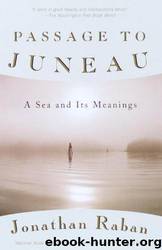Passage to Juneau: A Sea and Its Meanings by Jonathan Raban

Author:Jonathan Raban
Language: eng
Format: mobi, epub
Tags: Non-fiction, Travel, Adventure, History
ISBN: 9780307797261
Publisher: Vintage
Published: 1999-01-01T00:00:00+00:00
In open water now, I killed the engine, unfurled the genoa, and let the boat coast quietly on the breeze while I tried to raise a marine operator on the VHF. Clicking through radio channels containing only static, I at last found a voice from the station at Alert Bay, the Kwakiutl reserve on Cormorant Island, and put through a call to Seattle.
Radio amplified the ringing tone, whose forlorn throbbing filled the boat. There’s an audible difference between the sound of a telephone that will, in a few moments, be answered, and one that, at best, will say: “This is Jean … please leave a message.”
The words had the volume and sound quality of an announcement echoing through the porcelain tunnels of the London tube. “Mind the gap, please. Mind the gap!”
In a calm sea, the first sign of turbulent water ahead is often a slight roughening of the horizon line, like the deckle edge along the top of an invitation card. Odd, you think, but pay it no special attention. Only later do you realize it was a signal to batten down the hatches.
The great outpouring of tide from the interior had smoothed the walls of Johnstone Strait, a gully forty miles long and a thousand feet deep, between Vancouver Island and the labyrinth of smaller islands to the north. The place had an unpleasant reputation as a wind funnel, but that morning the southeasterly was blowing at a gentle ten to twelve knots, just enough to keep the boat moving nicely under sail. With the sun now breaking through the clouds and silvering the water, the strait was a cheering sight after my string of lonely days: a broad marine highway on which orderly lines of coasters, fishing boats, tugs, and barges were following the posted route between Puget Sound and Alaska. The skipper of a Seattle-registered purse-seiner stepped out from his freshly painted wheelhouse to give me a wave as he swept past; we were both of us now far enough away from our shared home port for the usual tribal hostilities between yachts and working boats to be forgotten.
The narrow entrance to Port Neville opened and closed again in what seemed like a flash, with the boat traveling much faster than the tide tables said it should. I was sailing at five knots, but the land was going past at eight, or so the GPS consistently reported. My best guess was that I was enjoying the benefit of “slippery water.”
Seawater, laden with chlorides and minerals, is heavier than fresh. When a river meets the sea, it’s liable to spill out in a wide fan across the top of the denser, saline water. So the brackish surface layer of an estuary can move independently of the saltwater tide below, sliding over it in a continuous ebb current, even when the deep tide is on the flood. Something like this was happening now on Johnstone Strait. The boat was riding on the fast surface current, while the true tide rolled sluggishly westward at a knot or less.
Download
Passage to Juneau: A Sea and Its Meanings by Jonathan Raban.epub
This site does not store any files on its server. We only index and link to content provided by other sites. Please contact the content providers to delete copyright contents if any and email us, we'll remove relevant links or contents immediately.
The River by Peter Heller(2344)
Breath by James Nestor;(2307)
Sea Survival Handbook by Keith Colwell(2242)
Fatal Storm by Rob Mundle(2215)
Deep by James Nestor(2180)
Lonely Planet Australia by Lonely Planet(2080)
Iced In by Chris Turney(2001)
Discover Australia by Lonely Planet(1948)
Lonely Planet Maldives (Travel Guide) by Planet Lonely & Masters Tom(1859)
FOR THE LOVE OF THE SEA by Bohnet Jennifer(1791)
One Girl One Dream by Dekker Laura(1680)
Looking for a Ship by John McPhee(1675)
Ten Degrees of Reckoning: The True Story of a Family's Love and the Will to Survive by Hester Rumberg(1654)
Chicken Soup for the Ocean Lover's Soul by Jack Canfield(1645)
Lonely Planet Australia (Travel Guide) by Lonely Planet & Lonely Planet(1593)
South with the Sun by Lynne Cox(1587)
The Wave In Pursuit of the Rogues, Freaks and Giants of the Ocean(1558)
Diver Down by Michael Ange(1506)
Marlinspike Sailor's Arts and Crafts by Barbara Merry(1488)
